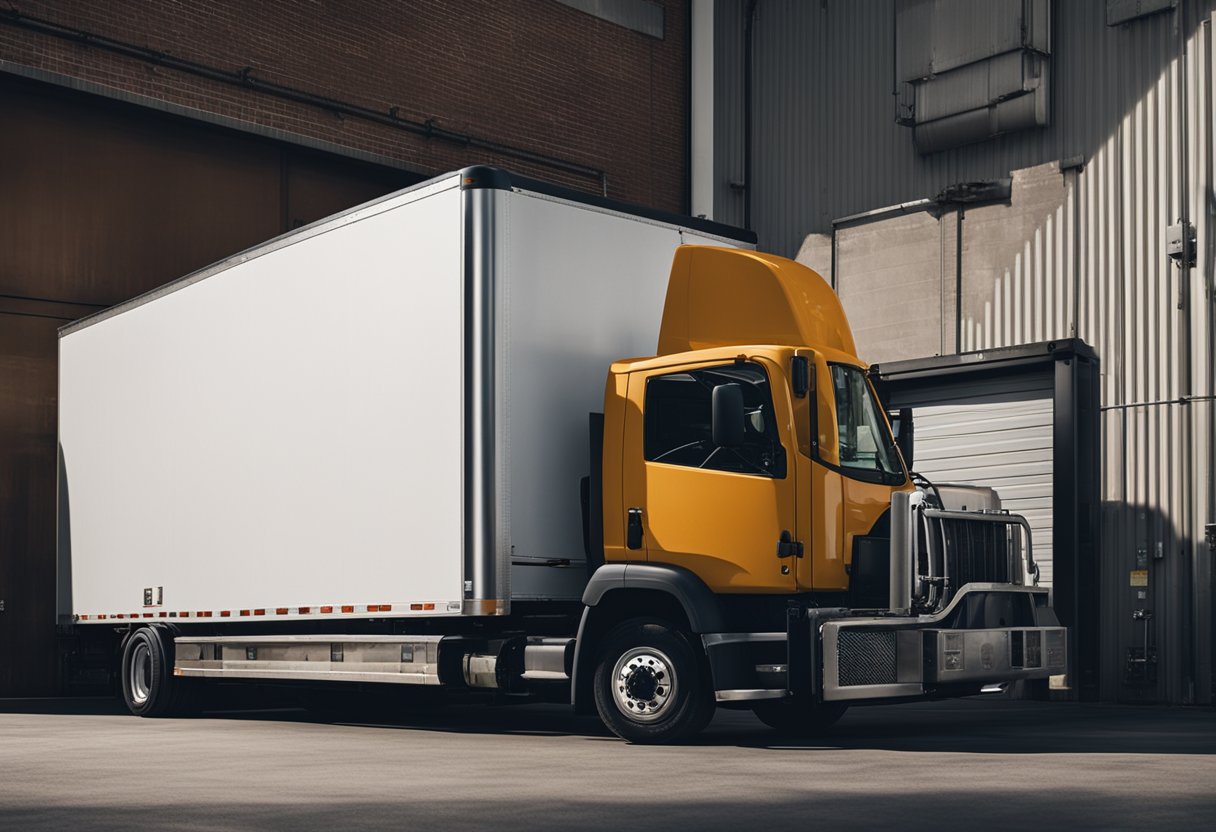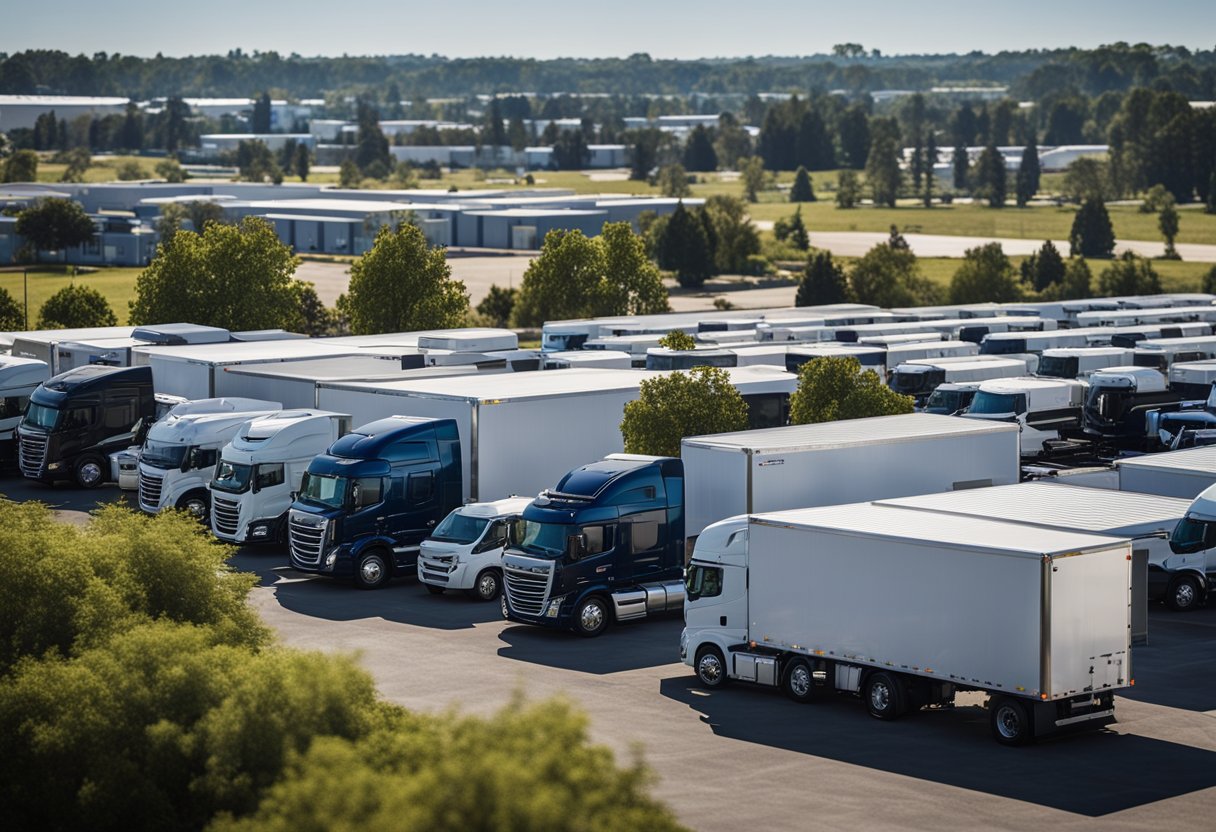A commercial truck is fundamentally a vehicle designed for the transport of goods and materials. Unlike personal vehicles, these trucks are equipped with large cargo spaces and are built to endure long distances and heavy loads. They vary in size, capacity, and design, catering to a diverse range of industry demands, from small delivery vans to massive long-haul 18-wheelers. Their construction is robust, aiming to maintain road safety standards while enabling the efficient movement of commerce across cities and countries.

Managing a commercial truck involves understanding its key components and specifications, which include the engine, transmission, braking systems, and safety features. Acquisition of a commercial truck—whether through purchase or lease—also requires knowledge of the current market, including foremost manufacturers and models. Additionally, ownership encompasses operating costs, which range from fuel to maintenance, and adherence to legal standards set forth for commercial vehicles. With continuous advancements in truck technology, today’s commercial trucks are becoming more fuel-efficient, environmentally friendly, and easier to navigate, which in turn has a substantial impact on the overall cost and experience of operating these vehicles.
Contents
Key Takeaways
- Commercial trucks are specialized vehicles designed for cargo transport, built to adhere to safety and efficiency standards.
- Understanding their major components and operating costs is crucial for effective management and ownership.
- Technological advancements and regulatory compliance play significant roles in the operation and evolution of commercial trucking.
Understanding Commercial Trucks
https://www.youtube.com/watch?v=nUWQYjg6MUQ&embed=true
Before diving into specifics, it’s essential to recognize that commercial trucks are diverse and serve various transport needs, from hauling cargo to transporting goods across cities and states.
Definitions and Classifications
I define commercial trucks as motor vehicles used for the transport of goods or paid passengers. They come in various sizes and are classified according to weight. The classification ranges from Class 1, which includes light commercial vehicles like pickup trucks, to Class 8, which comprises heavy-duty trucks such as tractor trailers. Notably, anything above a Class 3 rating is generally considered a large commercial vehicle. For example:
- Class 1: Gross Vehicle Weight Rating (GVWR) of 0-6,000 pounds (e.g., cargo vans)
- Class 2: GVWR of 6,001-10,000 pounds (e.g., box trucks)
- Class 3: GVWR of 10,001-14,000 pounds
- Class 4-6: Considered medium trucks
- Class 7-8: Heavy trucks, including dump trucks
Common Types of Commercial Trucks
Commercial trucks are purpose-built to perform specific jobs, which defines their types and structures. A pickup truck is one of the most recognizable forms, suitable for light-duty tasks and often seen in service roles or at construction sites. In contrast, cargo vans and box trucks cater to transport bulk items, with box trucks featuring a separate cargo area on a chassis. Also, versatility is seen in dump trucks, designed with a hydraulic lift to unload materials. Here’s an overview of a few common types:
- Van: Typically used for courier and delivery services.
- Pickup Truck: Ideal for light-duty transportation and utilized in various service industries.
- Box Truck: Utilized for freight transport, often featuring a cargo bay separate from the cab.
- Dump Truck: Used for transporting loose materials such as sand, gravel, or demolition waste.
Major Components and Specifications
https://www.youtube.com/watch?v=9zvCc8WYNqY&embed=true
When discussing commercial trucks, it is imperative to note that the major components and specifications that define their capabilities include robust engines and vast cargo capacities. They are designed to handle substantial payloads while maintaining performance.
Engine Power and Performance
Power and Torque: The heartbeat of a commercial truck lies in its engine, with output expressed in horsepower and torque. For instance, the staggering power behind the 6.7L High Output Power Stroke® Turbo Diesel Engine is a testament to this, as it delivers both high performance and efficiency.
- Horsepower: This specification measures engine performance. Commercial trucks, especially a super duty truck, rely on high horsepower ratings to move heavy loads effectively.
- Torque: This denotes the ability of the engine to do work. A high torque figure is essential as it indicates the force at which a commercial truck can pull a load, which directly impacts its towing capacity.
Vehicle Size and Capacity
GVWR and Payload:
- GVWR (Gross Vehicle Weight Rating): This refers to the total weight limit of the truck including its own weight plus passengers, cargo, and any additional equipment. It’s crucial for me to understand this, as exceeding the GVWR can impact the safety and longevity of the truck.
- Payload Capacity: This is the maximum weight that the truck is rated to carry. My knowledge dictates that this includes cargo and other ancillary weight and is subtracted from the GVWR to ensure the truck operates within its designated limits.
Commercial Truck Uses
https://www.youtube.com/watch?v=U-8GABPrivk&embed=true
In my expertise, commercial trucks serve critical roles in various sectors by moving goods and providing essential services across industries.
Industry Applications
Commercial trucks are indispensable in the logistics and transportation sector. I’ve observed tractor-trailers traversing highways, essential for the long-haul movement of inventory, from consumer goods to raw materials. In construction, flatbed trucks are routinely loaded with heavy materials and equipment, owing to their easy loading capacities. Similarly, tanker trucks are specialized for transporting liquids and gases, widely used in the chemical and fuel industries.
Service vehicles, such as utility and landscape trucks, are tailored for specific jobs. A landscape truck might be outfitted with tool racks and storage bins, proving crucial for carrying gardening tools and plants. Buses serve as a form of a commercial truck, primarily designed for passenger transport and often utilized for public transit or tourism activities.
Unique Vehicle Adaptations
Commercial trucks are adapted to meet unique industry needs. For example, a straight truck, known also as a box truck, is widely used for retail deliveries since my experience tells me they can navigate urban environments efficiently. Passenger vans are configured to carry people, hence their common use in shuttle services and school transportation.
Speaking of adaptations, some commercial trucks are modified into mobile service centers. Consider a utility truck equipped with a crane or lift; it can serve as an on-site repair vehicle for telecommunications or electrical maintenance jobs. And in the realm of medical services, I’ve seen commercial trucks modified as mobile clinics, which are instrumental in extending healthcare services to remote areas.
Buying and Selling Commercial Trucks
https://www.youtube.com/watch?v=rbfVgdPCsY8&embed=true
When engaging in the purchase or sale of commercial trucks, I focus on two key elements: locating reputable dealers and listings, and evaluating the essential factors before committing to a transaction.
Finding Dealers and Listings
I start my search for commercial trucks by identifying reputable dealers and available listings. I often use online platforms that aggregate trailers for sale along with used trucks, which allows me to compare available inventory efficiently. For those looking to sell, these platforms also provide visibility and reach to potential buyers.
- Online Listings: Sites like Truck Paper and Commercial Truck Trader are robust resources where I can find trucks and dealer contacts.
- Local Dealerships: Visiting nearby dealerships that specialize in commercial vehicles provides me a chance to inspect trucks in person.
Considerations for Purchase
Before I purchase a commercial truck, it’s imperative to scrutinize several aspects to ensure that the investment is sound.
- Truck’s Condition: I always inspect the truck’s mechanical state, especially for used trucks. Maintenance history and mileage are critical factors.
- Intended Use: The specifications and capabilities should align with my business needs, whether it’s long-haul transportation or local deliveries.
- Price Comparison: I do my homework to ascertain the fair market value, comparing similar models to ensure the asking price is reasonable.
By adhering to these structured approaches, I enhance my chances of a successful buy or sale.
Leading Manufacturers and Models

In the commercial truck industry, several well-established brands dominate the market. These manufacturers offer a variety of models designed to meet specific operational needs, ranging from light-duty to heavy-duty trucks. Here, I will delve into the popular brands and delve further into model-specific information that reflects the capabilities and specialties of these trucks.
Popular Brands
- Ford: Known for the F-Series, one of the best-selling truck lines globally.
- Chevrolet: Offers a versatile range of trucks including the widely used Silverado series.
- GMC: Shares platforms with Chevrolet but emphasizes more upscale features in models like the Sierra.
- Hino: A subsidiary of Toyota, Hino specializes in medium-duty commercial trucks.
- Isuzu: Recognized for reliability, particularly in the N-Series of light-duty trucks.
- Mack: An American icon in the heavy-duty truck sector with models like the Mack Granite.
- Volvo: Provides a mix of heavy-duty trucks known for their safety and innovation, such as the Volvo FH series.
Model-Specific Information
- Ford F-Series: A diverse lineup including the F-650 and F-750 for heavy commercial use.
- Chevrolet Silverado: The Silverado 2500HD and 3500HD are robust options for towing and hauling.
- GMC Sierra: Similar to the Silverado with added luxury, the Sierra HD is a high-performing option.
- Hino 268: A medium-duty leader, ideal for urban distribution and lease/rental applications.
- Isuzu N-Series: These trucks are favored for urban delivery services, featuring low-cab-forward design.
- Mack Granite: Known for durability and suited for construction applications.
- Volvo FH: Pioneers in driver comfort and safety, the FH series is engineered for long-haul efficiency.
Each of these manufacturers and their respective models showcase a commitment to quality, innovation, and the ability to meet a diverse range of commercial transport needs.
Ownership and Operating Costs
https://www.youtube.com/watch?v=Vw_sruxCV-Q&embed=true
When considering the ownership and operating costs of commercial trucks, I focus on the overall expenses over the vehicle’s lifespan, as well as upkeep needs that ensure their reliability and performance.
Total Cost of Ownership
For commercial trucks, which include full-size pickups, cab chassis, sleeper trucks, day cabs, and conventional sleeper trucks, the total cost of ownership extends beyond the initial purchase price. It encompasses all costs associated with acquiring and operating the vehicle over its useful life. This includes:
- Purchase price or lease payments
- Financing costs
- Insurance premiums
- Tax implications
- Depreciation
- Fuel consumption
- Licensing and registration fees
For instance, day cabs often have lower initial costs but might feature higher operational expenditures in urban settings when compared to sleeper trucks which could offer more efficiency for long-haul operations.
Maintenance and Repairs
Regular maintenance and repairs are key to retaining the value and extending the service life of commercial trucks. These costs can vary significantly based on the vehicle type and usage. A conventional sleeper truck, for example, which racks up many miles, will likely incur higher maintenance costs over time. Here’s what I generally track:
- Routine maintenance: oil changes, tire rotations, brake inspections
- Major repairs: engine overhauls, transmission replacements
- Unexpected expenses: accidents or parts failures
By ensuring preventive maintenance measures are routinely followed, unexpected repairs and downtime can be minimized, thereby improving the truck’s resale value and reliability on the road.
Advancements in Truck Technology
https://www.youtube.com/watch?v=dPcXT6MqiPg&embed=true
In recent years, I’ve observed significant progress in commercial truck technology, particularly focused on enhancing efficiency, safety, connectivity, and fleet management.
Innovations in Efficiency and Safety
I’ve seen vehicle and powertrain efficiency take center stage in the evolution of commercial trucks, aiming to reduce greenhouse gas (GHG) emissions. Developments in fuel cell technology serve as a testament to this commitment, with hydrogen emerging as a key player in the drive toward zero-emission vehicles.
- Aerodynamics: Streamlined body designs are reducing drag on all types of terrain.
- Weight Reduction: The use of composite materials is lowering the weight of trucks for increased fuel efficiency.
- Engine Technologies: Innovations like advanced diesel engines are optimizing fuel consumption and reducing emissions.
In terms of safety, advancements are just as impressive:
- Collision Mitigation Systems: These systems actively prevent accidents, crucial for safeguarding both the driver and cargo.
- Driver-Assist Features: Technologies such as lane departure warnings and adaptive cruise control support the driver in maintaining control of the vehicle.
Connectivity and Fleet Management
Connectivity in commercial trucks has transformed fleet management. The deployment of telematics systems enables me to monitor a host of vehicle parameters in real-time.
- Vehicle Tracking: GPS technology provides precise location data, improving route planning and cargo tracking.
- Diagnostics: Remote diagnostic capabilities allow for preemptive maintenance, reducing downtime and extending vehicle life.
Connectivity extends into the truck’s interior, enhancing the driver’s experience:
- Infotainment Systems: Touchscreen interfaces and hands-free communication options keep drivers informed and focused.
- Driver Comfort: Ergonomically designed interiors increase driver comfort, which is critical for long-haul journeys.
By harnessing these technologies, the industry is paving the way for a new era of commercial trucking—smarter, safer, and far more efficient than ever before.
Legal and Regulatory Considerations
https://www.youtube.com/watch?v=HFian-za_YE&embed=true
In the realm of commercial trucks, I find that the legal and regulatory framework serves as a crucial foundation for their operation. This includes a detailed understanding of the necessary licenses and adherence to environmental standards.
Licensing and Regulations
To operate a Class 8 commercial truck, which is defined by its weight rating, I must hold a valid Commercial Driver’s License (CDL). The requirements for obtaining a CDL are rigorous due to the complexity and potential safety risks associated with operating heavy-duty vehicles that often engage in towing and long-haul transportation.
- Obtain a CDL: Must pass both knowledge and skills tests.
- Specific Endorsements: For towing vehicles, an additional endorsement on my CDL is required.
- Regular Inspections: Vehicles must pass safety inspections to adhere to federal and state regulations.
I recognize that these regulations are in place to ensure that I, as a driver, am capable and that my vehicle is safe to operate on public roads.
Environmental Compliance
The environmental regulations for commercial vehicles, particularly Class 8 trucks, focus on reducing emissions and promoting sustainability. As a driver or operator of such vehicles, I must ensure compliance with the Environmental Protection Agency (EPA) standards, which include the following:
- Emission Controls: Trucks must be equipped with technology to reduce emissions.
- Idling Regulations: Many states have laws to limit engine idling, aiming to reduce fuel consumption and emissions.
These measures are crucial for reducing the environmental impact of commercial trucks and maintaining public health. Understanding and adhering to these regulations not only supports legal compliance but also contributes to a greener transportation industry.
Frequently Asked Questions
https://www.youtube.com/watch?v=UASYKEASJdM&embed=true
In this section, I will address some of the common inquiries regarding commercial trucks, specifically focusing on their classification, regulatory distinctions, and various implications of owning and operating such a vehicle.
How are commercial trucks classified by regulatory bodies?
Commercial trucks are classified by regulatory bodies such as the Department of Transportation based on factors like their Gross Vehicle Weight Rating (GVWR), intended use, and the type of goods they carry. These classifications dictate various regulations including licensing requirements, inspection standards, and hours-of-service regulations.
Why would a pickup truck be categorized as a commercial vehicle?
A pickup truck may be categorized as a commercial vehicle if it is used for business purposes, like towing, hauling cargo, or carrying commercial equipment. Additionally, if the GVWR is above a certain threshold, it may be classified as commercial regardless of its use.
What differentiates commercial trucks from non-commercial trucks?
Commercial trucks are primarily differentiated from non-commercial trucks by their intended use for business and commercial activities. They also often feature a higher GVWR, are equipped to transport goods or passengers, and must comply with specific governmental regulations.
What implications do commercial plates have compared to passenger plates for trucks?
Commercial plates indicate that a truck is used for commercial purposes and may be subject to different taxation, insurance rates, and compliance with regulations like safety inspections. Trucks with passenger plates are typically personal vehicles and not used for business.
How is the price of a commercial truck typically determined?
The price of a commercial truck is typically determined by factors such as size, load capacity, engine power, brand, and additional features for specific commercial needs. Customization for a particular industry and advanced technology can also affect the cost.
What constitutes the commercial vehicle designation according to the DMV?
The DMV typically designates a vehicle as commercial based on its use for business operations, GVWR, the number of axles, and whether it is used for hauling cargo or passengers. Specific criteria can vary from state to state.

